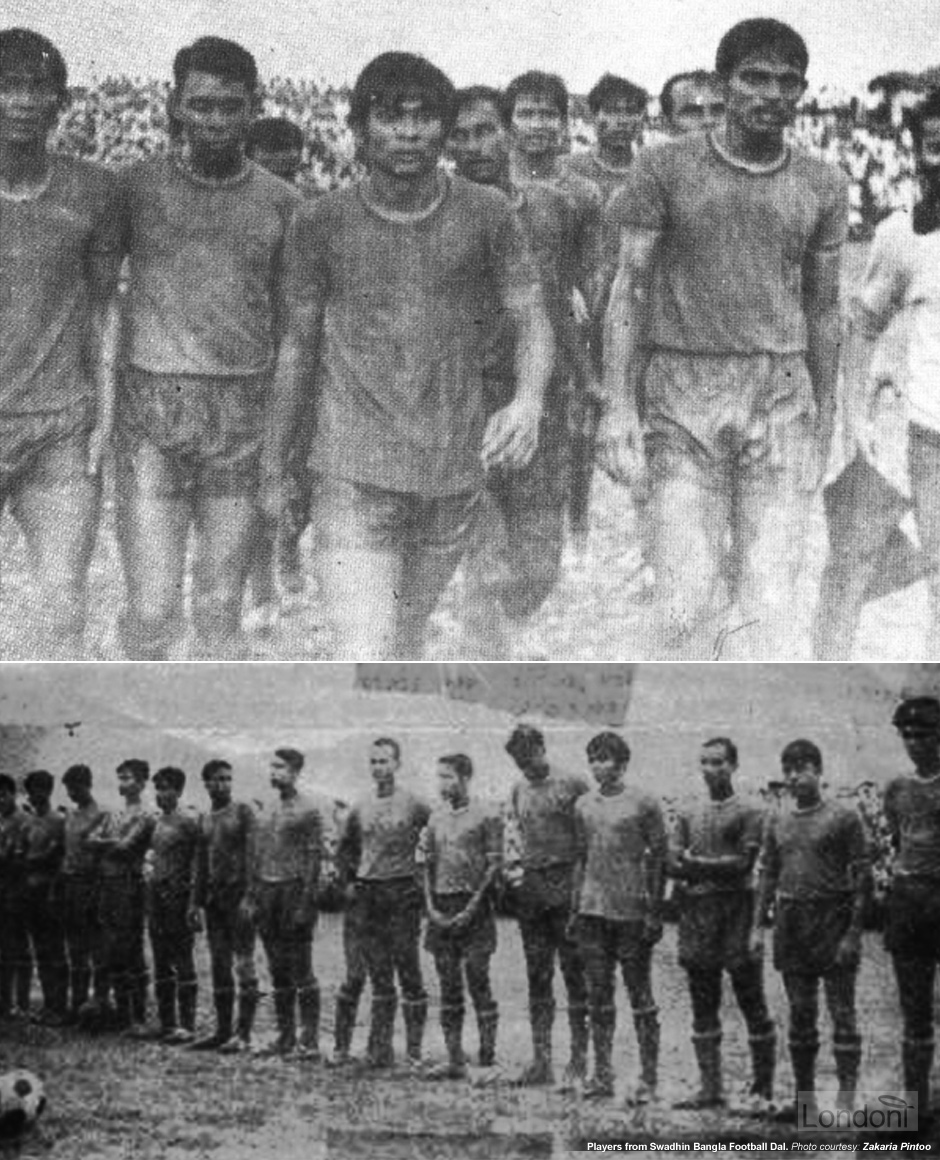
Swadhin Bangla Football Dal - first football team of Bangladesh
Last updated: 5 October 2017 From the section 1971 Muktijuddho
Young ones loot Pakistani army rifles for muktijuddhas
Early one morning, pre-dawn, Saidur Rahman Patel looted the Shutapur thana with 27 young boys whilst the Pakistani army were residing in the Lalkuti camp in Forozganj following their barbaric killing during Operation Searchlight. The gang escaped with thirty-one (31) 3.03 rifles. Immediately afterward Saidur crossed the river and headed for the village of Nuwapur in Vikrampur where he handed the rifles over to the Bengali jawans. Afterward he made the long trek to Kolkata via Agartala along with his companion Lutfor Rahman, Mujibur Rahman Buya and Mohsin.
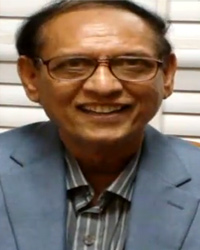 Saidur Rahman Patel ()
Saidur Rahman Patel ()  Lutfor Rahman ()
Lutfor Rahman ()  Mujibur Rahman Buya ()
Mujibur Rahman Buya ()  Mohsin ()
Mohsin ()
Football as a weapon
Once in Kolkata, Saidur contemplated on how he could help his country. Like all other fellow Bengalis Saidur had a burning desire to free his motherland from Pakistani oppression but was overwhelmed by the magnitude of the task ahead. Within a week he came up with an idea. Saidur was a professional football player in Pakistan PWD (Public Works Department) team and played in the premier division. So he decided to use his sports background to contribute to the war. Saidur came up with the idea of playing a series of exhibition matches across India to generate money for the Muktijuddho Fund and to raise awareness about the war and generate public awareness for the creation of a new independent nation.
He shared the idea with his friends and they contacted MP Shamsul Haq with the proposal. All five men then went to meet Prime Minister Tajuddin Ahmad at his office in the Mujibnagar headquarter at 8 Theatre Road.
I proposed my idea to Tajuddin Ahmad that I wanted to form a Swadhin Bangla Football Dal here.
He asked me "What made you think of this?"
I replied "I want to do something for the country as a football player to help our freedom fighters and to raise awareness amongst the general public."
Tajuddin Ahmad then stood upright and hugged me and said "Patel, young chap, how did you come up with such a beautiful thought!! You have my full support. Do you think you can achieve this?"
I replied "Inshallah, we can".
Formation of the team & radio announcement via SBBK/Akashbani to recruit players
Saidur Rahman Patel notified the prime minister that they'd need permission from Indian Football Association (IFA) and a practice field for the team. They then left the meeting. Now the serious work lay ahead. How do they recruit the players to form a squad? Who would actually be in the team?
 Shamsul Haq ()
Shamsul Haq ()
Finally, once IFA granted them permission, they went to hire a flat for the accommodation of the players. They chose flat number 17 in Carnegie Mansion, just walking distance from the Mujibnagar headquarter. The flat was owned by Akbar Ali, who was originally from Comilla, Bangladesh. The deposit for the flat was Rs. 20,000 and the monthly rent was Rs. 450. This was much beyond their limited budget. So Saidur Rahman Patel told Akbar Ali of their plan and asked him to forgo the deposit.
I told brother Akbar, "Akbar bhai, we can't give you the Rs. 20,000 deposit which we've received for the country, but we can pay you Rs. 450".
He grabbed me and send, "Chotto bhai [younger brother], you have given me an opportunity to do something for our country. You can stay in this flat as long as you like free of charge.
Akbar Ali's magnanimous offer provided a great boost and was symbolic of the patriotic acts that many Bengalis carried out that year. With the money saved, the group of friends brought the necessary equipment to get them started. It was around this time they met Sheikh Ashraf Ali, another fellow professional football player, who resided in nearby Park Circus. Ashraf instantly agreed to play.
In order to recruit the players regular announcements were made via Swadhin Bangla Betar Kendra that a 'Swadhin Bangla Football Dal' was being formed and all interested players should report to 17 Carnegie Mansion, Kolkata. According to another popular version of the story, the announcements were in fact made on Akashbani, a popular radio channel transmitted from Kolkata, urging players who were near the border to come and join the team. It's possible that both radio channel had broadcasted the announcements.
In time around 30 players signed up for trials under the supervision of coach Nani Basak. Nani, whose daughter Jharna Basak (more popularly known by her stage name Shabnam) was a multiple award-winning movie star in Pakistan, then drilled it down to 25 players after try-outs. Amongst these were famous players like Kazi Salahuddin, Enayetur Rahman Khan, Pratap Shankar Hazra, Shahjahan Alam and many more who came from all over Bangladesh. A few other well-known names were later added to the team once it started to tour India, bringing the total number of players to 36.
Full squad of players:
- Zakaria Pintoo (Captain)
- Pratap Shankar Hazra (Vice Captain)
- Ali Imam
- Amlesh Sen
- Md. Ainul Haque
- Sheikh Ashraf Ali
- Bimal Kar (Chittagong)
- Shajahan Alam
- Sheikh Monsur Ali Lalu
- Kazi Mohammad Salahuddin
- Md. Enayetur Rahman Khan
- K. N. Nawsheruzzaman
- Subhash Chandra Shaha (Narshingdi)
- Fazle Hossain Khokon (Rajshahi)
- Abul Hakim (Jessore)
- Taslimuddin Sheikh
- Aminul Islam Suruz (Barisal)
- Abdul Momin Joarder (Chuadanga)
- Moniruzzaman Peara (former secretary, Kushtia DSA)
- Abdus Sattar
- Pran Govinda Kundu
- Mujibur Rahman
- Major General Khondokar Md. Nurunnabi
- Lutfor Rahman (Jessore)
- Aniruddha Chatterjee
- Sanjit Kumar Dey
- Mahmudur Rashid
- Saidur Rahman Patel
- Dewan Md. Sirajuddin (Siru)
- Nihar Kanti Das
- Md. Mozzammel Haq
- Biren Das Biru
- Abdul Khaleq
- Mohammed Kaikobad
- Mahmudur Rahman
- Kaiser Hamid
 Nani Basak ()
Nani Basak ()
Overlooking personal tragedies for collective glory
They [i.e. Mujibnagar government] asked us if we wanted to help. We were very happy to hear the news, since we were already in the process of forming a team.
Amongst the final group of players was a 17-year-old Kazi Salahuddin, who later became first player from Bangladesh to play in the professional league in Hong Kong and arguably Bangladesh's most famous football player ever. Prior to the war Salahuddin went to West Pakistan to play in the regional championship for Dhaka. After the tournament he was called to join the camp for the Pakistan national football team. He came back to Dhaka on 20 March 1971 but was only in the country for five days when Operation Searchlight was carried out. His family wanted him to go to London but young Salahuddin wanted to take part in the Bangladesh Liberation War. His father agreed and he crossed the border to reach Agartala where he joined the training camp for the guerrilla soldiers. Later, he heard about Swadhin Bangla Football Dal from a photo journalist. The journalist, from Kolkata, convinced him to play for the team and explained to him the importance about growing public support for the war. Salahuddin decided to play and went to Kolkata on a Cargo Plane of the Indian Air Force. Once there, he met with many of his teammates from Dhaka and played his first match for the team against Mohun Bagan, a team from Kolkata.
Kazi Salahuddin, the current president of the Bangladesh Football Federation, played under the pseudonym 'Turjo Hazra' borrowing Pratap Shankar Hazra's surname to ensure the safety of his family in the then East Pakistan.
The Daily Star (Bangladesh)
Once the team was formed, 27 days later Zakaria Pintoo joined the team.
In 1971 Mohammad Zakaria Pintoo (also spelt Pinto or Pintu) was a famous professional football player, one of the very few Bengali to play for the Pakistan national team.
My father, Captain (retd) Dr Nazib Uddin Ahmed, was a renowned physician in the armed forces during that time and he had a desire that I will also become a doctor one day when I grow up. But really all my attention was reserved for football. Finally, my father accepted my attraction towards the game and I started playing football seriously in 1955.
...Few players in Bangladesh got the chance to represent the all-Pakistan national football team and I was one of them. Just before the liberation war, we were deprived of some things by a few Pakistani officials and that’s why we were always determined to do well.
If Bangladesh is my motherland, my second residence is Agartala. I am a freedom fighter. The help that we got from here during the 1971 War of Liberation is unparalleled.
When Bangabandhu asked us to join the war with whatever we had in his speech on 7 March 1971, I thought to myself, I have nothing but football to offer.
I was prepared to join the war, but then my wife told me to form a team and contribute in the best way I could. So I went to Kolkata, where I found that some players were already thinking about forming such a team.
Tanvir Mazharul Islam Tanna was selected as Manager whilst 32-year-old Mohammad Zakaria Pintoo was selected as team captain as he was the senior most player. Pratap Shankar Hazra was selected as vice captain.
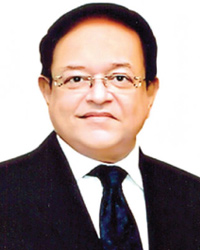 Tanvir Mazharul Islam Tanna ()
Tanvir Mazharul Islam Tanna () 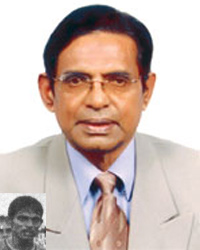 Mohammad Zakaria Pintoo ()
Mohammad Zakaria Pintoo () 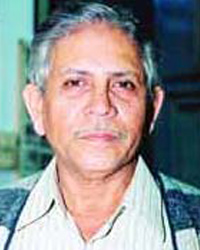 Pratap Shankar Hazra ()
Pratap Shankar Hazra () 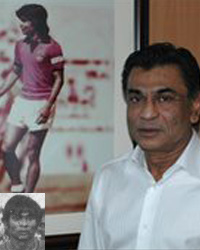 Kazi Mohammad Salahuddin ()
Kazi Mohammad Salahuddin ()
In June 1971 Shamsul Haq formed a sports association in Kolkata called 'Bangladesh Krira Samity' with a view to helping the team. Lutfor Rahman was appointed as its first secretary.
The Liberation War of 1971 was fought on many fronts. While some used guns and bayonets to fight the Pakistani army, others wrote passionate essays and fiction portraying the atrocities of the occupation. While some travelled all over the country, singing songs of freedom to motivate the people, others nursed the wounded. However, 31 [it was actually 36] people participated in the war in one of the most unexpected ways possible. Instead of taking up arms against the Pakistani army, they took up football. Curling free kicks and remarkable passes replaced guns and bombs as they fought their battles in football fields across India.
The Daily Star (Bangladesh)
First match and the first time in a public arena that Jatiyo Potaka hoisted on foreign land
On 24 July 1971 the day had come. It was time for the first football team of Bangladesh to make it's mark on history. The venue: Krishnanagar Stadium in West Bengal. The opposition: Nadia Ekadosh (District Eleven). Around 15,000 spectators waited in anticipation for this groundbreaking game. Each Swadhin Bangla player had to endure their own personal battle to reach this stage. Many had to flee persecution, torture, mass killing to get here. But for the next 90 minutes these young men had to be more than footballers. They had to be ambassadors for 75 million people of Bangladesh. It was time to make history.
Captain Zakaria Pintoo had the honour of leading the team out. On hand to capture the historic moment was photojournalist Topon Chatterjee, who travelled with the team for the rest of their tour.
Our emotions were running high. It was a mission for us. We were playing soccer to free our country.
We were yet to get recognition as a country then but all the players kissed the national flag before the match.
But the drama was set to continue. The local organisers refused to hoist the Bangladesh flag. After half an hour of negotiation and restlessness the District Collector (also called a district officer, Deputy Commissioner or District Magistrate) D. K. Ghosh risked his job by allowing Zakaria Pintoo to hoist red, green and yellow flag of Bangladesh to the immense pride of all Bengali staff and spectators. It was the first time that the Jatiyo Potaka was hoisted on foreign soil in a public arena.
At first, the authorities didn't allow us to let us hoist our flag, but we refused play otherwise. After all, if they could fly their national flag, why couldn't we fly ours? After half an hour or so, when the crowd became restless and rowdy, the then DC let us raise our flag, even though legally the Indian government couldn't acknowledge the existence of Bangladesh. We sang 'Amar Shonar Bangla' and then paraded the field with our flag and heads held high.
I still remember that day. It is the most memorable moment of my life being the first person to hoist the Bangladesh flag outside the country. It was also a historic moment for Bangladesh football.
Wherever Pintu's men went be it in West Bengal, Maharashtra or Bihar they were greeted with open arms. It was a sight to behold for all present at each and every venue when they paraded with a symbolic red and green flag with a map of yet to be born Bangladesh was embedded in it on the ground.
After some thrilling exchanges the game ended in a 2-2 draw. But the game had far reaching consequences which went beyond the stadium.
The powerful western media lashed at the India football administration for allowing the game to go ahead. The Indian government reacted to the harsh criticism by suspending the District Magistrate of Nadia for fielding an official team. The Indian football association (IFA) was also forced to cancel the affiliation Nadia District Sports Association for hosting the Swadhin Bangla Football Dal. The sanctions had an immediate impact. From then onwards any team that played against the Swadhin Bangla team didn't use their official name. The second match was played against the famous Kolkata-based team Mohun Bagan which played under the psuedonym 'Goshtopal Eleven' for fear of suspension from IFA.
India Football Association (IFA) was under pressure from FIFA. The Indian teams and the IFA had to bend a few rules in order to allow the team to represent the yet to be free Bangladesh.
The Daily Star (Bangladesh)
Throughout their India tour the Swadhin Bangla Football Dal were received warmly. However, there was one match which shook the players.
 D. K. Ghosh ()
D. K. Ghosh ()  Topon Chatterjee ()
Topon Chatterjee ()
Players narrowly escape crowd beating in Bihar
The situation between the Biharis and the Muslim Bengalis in Bangladesh had been very volatile in 1971. The Biharis accused the Muslims of persecution, whilst the Muslims labelled the Biharis razakars and accused them of collaborating with the Pakistani army. Each group viewed the other with high suspicion. Treachery and killing became the norm. Thus tension was rife when the Swadhin Bangla team participated in a game in the state of Bihar. The team was initially prohibited from playing in Bihar but they had finally convinced the authorities by promising not to score any goal during the game. The authorities agreed and permitted them to play on the soil of Bihar. However, all hell broke loose when a long clearance by a Swadhin Bangla defender caught the local side off-guard and entered the goal accidentally. It was only through the intervention of the police that the players escaped being beaten "black and blue" by the spectators.
Immediately we were gheraoed, and but for the timely intervention of the police, we wouldn't have returned in one piece.
Last match supported by legendary actor Dilip Kumar and Saif Ali Khan's father
Apart from collecting money for the Muktijuddho Fund, one of the main objectives of the football matches was to increase the awareness of Indians, especially Indian Muslims, about the Liberation War.
Many Muslims there believed that the war was being instigated by Hindus in East Pakistan. They couldn't accept that Bengali Muslims wanted to be free from West Pakistan.
Before that they were against us, and wanted to stop the match, but once they realised that Muslims were also involved in the war, the spectators began to cheer for us and support us.
But it was the last match in India which would catapult the Swadhin Bangla Football Dal to another level. The location was India's second city of Mumbai, then called Bombay. The opposition was Maharashtra Eleven and their captain was interestingly the Indian national cricket team captain Mansoor Ali Khan, the Nawab of Bhopal & Pataudi nicknamed 'Tiger Pataudi' who is also the father of Bollywood stars Saif Ali Khan and Soha Ali Khan. The participation of a cricketing legend in a cricket obsessed nation and, more importantly for the Swadhin Bangla, an Indian Muslim, created a national buzz. Amongst the crowd was his famous wife Sharmilla Tagore, a legendary Indian movie star, and music maestro S. D. Burman.
But it was the surprise appearance of one man seated in the VIP enclosure who stole the show - Dilip Kumar. The international movie superstar, born in Peshawar, Pakistan as Muhammad Yusuf Khan, was then at the peak of his glittering career. He was shooting for his film Sagina Mahato at the time. Ironically, it was a Bengali movie directed by Tapan Sinha and co-starring Saira Banu, later Dilip Kumar's wife, which is based on the true story of the labour movement of 1942-43. But Dilip Kumar got the shooting cancelled for a day and came to watch the game. The support from the screen moghul, arguably India's all-time greatest actor, provided the much needed national and international attention which the Swadhin Bangla Football Dal was striving for. If that was not enough, Dilip Kumar donated Rs. 20,000 to the team, a huge amount at the time.
You will succeed.
What Dilip Kumar told Pintu and the other players after the match
Nawab Pataudi, who scored a goal in the game, also kindly donated Rs. 30,000 to the Muktijuddho Fund.
The Nawab not only played, but he also came forward to personally donate Rs 30,000. We still savour the incident.
Zakaria Pintoo recalls Mansoor Ali Khan Pataudi's contribution
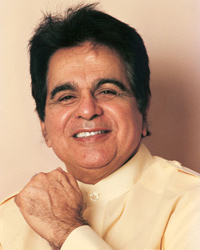 Dilip Kumar (aka Muhammad Yusuf Khan) ()
Dilip Kumar (aka Muhammad Yusuf Khan) () 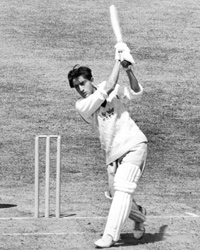 Mansoor Ali Khan (Nawab of Pataudi & Bhopal) ()
Mansoor Ali Khan (Nawab of Pataudi & Bhopal) () 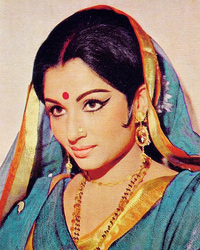 Sharmilla Tagore ()
Sharmilla Tagore ()  S. D. Burman ()
S. D. Burman ()
Tk. 5 lakh raised
In total, the Swadhin Bangla Football Dal played 16 matches in India, winning 13 losing two and drawing one. They collected Tk. 5 lakh in the process, a huge amount of money back then. This money was then given to the Mujibnagar Government to fight the war.
When we made our donation, the fund's balance was nil. We have heard that our money was used to buy arms for the freedom fighters for the first time. That is definitely one of our achievements.
...Brazil, Argentina, Spain might be world champions now, but we are the first country in the world which had a freedom fighter's football team. People supported us everywhere we played, which we are very grateful for. We were the first football team to hoist our own flag in foreign soil.
Our names have been included in the Freedom Fighter's Gazette. We were already in camps, preparing for the war, when the High Commission urged us to come and join the team. Thirty of us were selected, and the rest went back to fighting in the war. We joined the team on the country's appeal, so I feel proud to be a part of it.
Amlesh Sen, team member of Swadhin Bangla Football Dal and later a manager of Abahani
Swadhin Bangla football team would remain like an eternal flame irrespective of cast, creed and political affiliation.
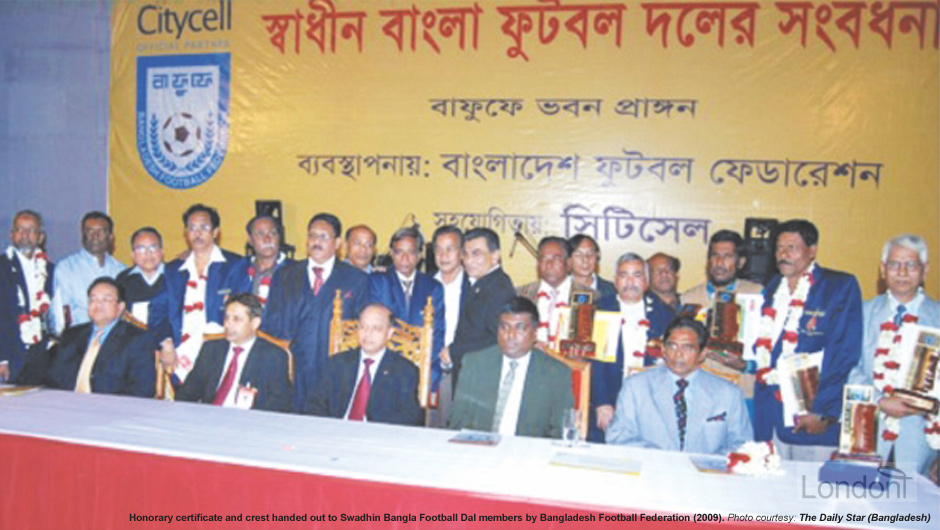
Recognition
Unsung heroes
After the war the vast majority of the Swadhin Bangla Football Dal players went on to play for different leagues and represent the national team. They made names for themselves as talented footballers. However, it was their brave contribution during the war - fighting in the way they know best: with a ball on their feet - that made them stand out in the pages of history.
Teams will come and teams will go, but there won't ever be a team like ours.
Following the assassination of Sheikh Mujibur Rahman in 1975 Saidur Rahman Patel became a political prisoner and was sentenced for 6 years in jail.
When Ziaur Rahman became President, I picked up a newspaper in jail and saw on the front page a huge article on Swadhin Bangla Football Dal. On the inside cover there was a misleading article discussing why the Awami League did not give Zakaria Pintoo an honorary award for his contribution in forming the Swadhin Bangla Football Dal. My name was nowhere in the article. So I started crying. Abdus Samad Azad [the former foreign minister] was in the same cell as me and he comforted me by saying, "Patel, nobody can hide real history. Some day the truth will come out so don't think about it and don't be upset".
Bangladesh Football Federation (BFF) unveil a plaque and award certificates and crests to team
Although members of the team received accolades and receptions from various organisations for their great contribution - including a Swadhinata Purushkar (Independence Day Award) for Zakaria Pintoo (1995) and Kazi Mohammad Salahuddin (1996) - the Bangladesh Football Federation (BFF) had never come forward to pay homage to the footballers. This changed in 2009 when Kazi Salahuddin - "who refused the lure of an animated life in England then to be a part of that glorious chapter of our football history" - became the BFF's President.
On 4 January 2009, 37 years after the Liberation War, the country's football war heroes finally got their long overdue respect from the BFF. The organisation arranged a reception in honour of the Swadhin Bangla Football Dal and invited all the surviving members to attend the prestigious ceremony. Chief of Army Staff General Moeen Uddin Ahmed, also the chairman of National Sports Council (NSC) and president of Bangladesh Olympic Association (BOA), unveiled a plaque dedicated to the Swadhin Bangla team at the BFF Bhaban premises.
General Moeen Uddin Ahmed praised the members of the team for their innovative approach.
I am proud that the sportsmen of the country were not behind during the Liberation War. They fought on their own frontier and raised 3.5 lakh Rupees [5 lakh Taka] for the fund of the government.
General Moeen Uddin Ahmed, Chief of Army Staff
As BFF president, everyone expected the country's greatest footballer - arguably - to be on stage last night but Salahuddin chose to sit with his comrades and take certificate and crest like the others from Chief of Army Staff General Moeen U Ahmed, who graced the programme at the ground adjacent to the BFF Bhaban as chief guest.
The Daily Star (Bangladesh)
Former manager Tavir Mazharul Islam Tanna and captain Zakaria Pinto also gave emotional speeches recalling the valiant efforts of many unsung heroes. Other special guests also praised the team for their great contribution.
Many players of the Swadhin Bangla Dal were playing for Pakistan then. The Pakistanis wanted to involve them in a match in Dhaka to show the world that life was normal here.
Then we contacted the Mujibnagar government to do something about it. In time, 100 to 150 men joined our camp. There were other sportsmen with us like Roquibul Hassan (ex-Bangladesh cricket captain), Arun Nandi (late swimmer) and Ataul Haque Mullick (late sportsperson and sports journalist). The money we raised went to the government fund. The players received a meagre Tk 3 per week.
A Bangladesh Krira Samity was formed but people have forgotten about it. I wish it got recognition today, like we did 37 years ago by playing football.
Many have left us, some are living abroad, I feel their absence from the bottom of my heart. I remember the day 24 July 1971 fondly. That day, we hoisted the flag of the nation at the Krishnanagar Stadium in Nadia district.
Hats off to Ghosh, who was invited but could not join us here today due unavoidable reasons.
We are part of history and I have tried all my life to let the people know what we had done.
They had great contribution to the war and gave us inspiration to win [the war].
Abdus Salam Murshedi, former national team striker and later Senior Vice President of BFF
Standing on the shoulders of the giants, Bangladesh will one day play in the World Cup football.
Ananda Rajah Singham, Head of Marketing of BFF sponsor Citycell and a special guest of the ceremony
Nominated for Swadhinata Purushkar
In November 2013 the Bangladesh Football Federation (BFF) nominated Swadhin Bangla Football Dal for the consideration of the Swadhinata Purushkar (Independence Day Award) 2014, Bangladesh's highest state award, for its contribution during 1971 Liberation War. Earlier, Bangladesh Cricket Board and Bangladesh Ansar-VDP (also known as Ansar Bahini ) had received the prestigious award in 2001 and 2004 respectively. Therefore the BFF judged it only fitting for the Swadhin Bangla Football Dal to finally receive its overdue recognition and sent their unique nomination to the National Sports Council (NSC) for due consideration.
Swadhin Bangla Football Team contributed greatly to our liberation war and it hoisted the national flag outside the country, which is why we have nominated it instead of an individual performer.
Abdus Salam Murshedi, BFF senior vice president
I lost my mother while playing football. This will always remain the biggest dissatisfaction of my life. She breathed her last while I was out in the field and I feel pain every time I think about her.
Besides that, the government never nominated my Swadhin Bangla football team for the Swadhinata Award and that also makes me sad.
If the power of football was ever used as a weapon to fight a war then the name of Swadhin Bangla Football Team will go down in the history of the people's game as second to none.
It was in 1971 when blood and tears were shed by millions of peace loving people during the War of Liberation against the brutal Pakistan occupational forces that some bold footballers and sports organisers floated the idea of a team to spread the word 'Independence' throughout the rest of the world.
The Daily Star (Bangladesh)
